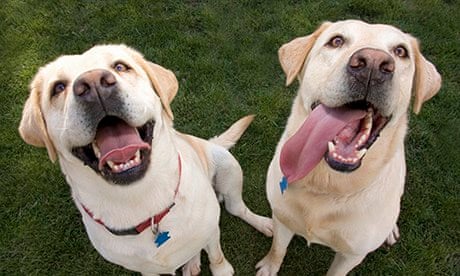I feel an instinctive fondness for dog lovers, and distrust those who dislike them. So a column by Ben Fogle this week about his deep-rooted suspicion of the dogless politician, struck a chord with me.
And yet something about Fogle's article was rather jarring. Why was it planted so firmly in the Daily Telegraph men's section? Why should every man own a dog? We all know the saying "a dog is a man's best friend", but the gendering of the article runs a little deeper than semantics. Dogs, he says, are suited to men in their simplicity. Dogs need only food, strokes and walks to satisfy them – and men, too, are of simple tastes, surviving contentedly on an unsophisticated diet of food, sex and football.
Laying aside the more overt gender stereotyping here (men are straightforward, not like mysterious, complicated, emotional women), Fogle's alignment of dogs with masculinity is surely symptomatic of a wider cultural association. It's no coincidence that in the children's classic The Incredible Journey, the two boys have a sturdy hound each, while the girl has a pretty little siamese cat. I know many people who, growing up, thought that cats and dogs were of the same species: cats the girls and dogs the bouncing boys.
I can't say I made the same mistake. As a child, I was fixated with dogs: not only did I want one, I became one. After an aunt innocently gave me a clunky VHS copy of 101 Dalmatians, I wore a dalmatian onesie permanently, even to my first school disco. When I grew out of it, I forced my mum to separate the feet from the legs so I could keep wearing it, my tell-tale human ankles the only thing gradually distancing myself from my doggie identity. On my fifth birthday my grandad had painstakingly assembled a beautiful wooden Wendy house for me in our garden. I finally decided I liked it after telling everyone it was my new kennel.
This was partly in aid of my campaign to persuade my parents to let me have a dog of my own. I had read I Want a Cat! by Tony Ross, in which the protagonist refuses to remove her cat costume until her parents eventually buy her a kitten. My own success came on my ninth birthday, when I finally received Huggy, a nervous lurcher with an inexplicably human smile. My relationship with Huggy was more joyful, secure and reciprocal than many of my human ones, my dogless life before and since characterised by overwhelming canine cravings.
Women throughout history have shared particularly intimate relationships with their canine pals. Queen Victoria, on her deathbed, asked for the company of her Pomeranian, Turi, who stayed with her in her final moments. Elizabeth Barrett Browning said of her dog Flush: "He and I are inseparable companions, and I have vowed him my perpetual society in exchange for his devotion." Virginia Woolf would later write an account of the Brownings' life from Flush's perspective, and had her own treasured dog photographed for the jacket. One of her very first essays, published in the Guardian in 1905, was an obituary of the family dog. "So we say farewell to a dear and faithful friend," she writes, "whose virtues we remember – and dogs have few faults."
When Billie Holiday was released from prison, her boxer, Mister, leapt on her with such affection that it was thought to be attacking her, drawing a crowd of reporters. More recently, women such as Lena Dunham and Fiona Apple have written beautifully and forcefully on their fierce love for their dogs. Jennifer Aniston had the name of her Welsh corgi terrier cross, Norman, tattooed on her foot after he died.
The cliched image of Paris Hilton lookalikes shoving tiny yapping puppies carelessly and unceremoniously into pink handbags has damaged an already skewed perception of pets and gender in the media. But figures from the Kennel Club last year demonstrated that in the UK, twice as many women as men own dogs. So let's not fall foul of lazy stereotyping. We love dogs because they are loyal, devoted, sympathetic and playful. These are not masculine traits. These are virtues reflected in the best kinds of all people.







